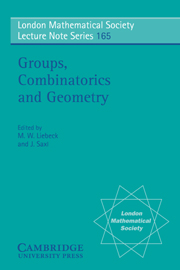Book contents
- Frontmatter
- Contents
- Authors' Addresses
- Introduction
- Part 1 Sporadic groups
- Part 2 Moonshine
- Part 3 Local and geometric methods in group theory
- Part 4 Geometries and related groups
- Part 5 Finite and algebraic groups of Lie type
- Part 6 Finite permutation groups
- Part 7 Further aspects of simple groups
- Part 8 Related topics
- 36 The orbifold notation for surface groups
- 37 A remark on two Diophantine equations of Peter Cameron
- 38 Testing for isomorphism between finitely presented groups
- 39 Discrete groups and, Galois theory
38 - Testing for isomorphism between finitely presented groups
Published online by Cambridge University Press: 07 September 2010
- Frontmatter
- Contents
- Authors' Addresses
- Introduction
- Part 1 Sporadic groups
- Part 2 Moonshine
- Part 3 Local and geometric methods in group theory
- Part 4 Geometries and related groups
- Part 5 Finite and algebraic groups of Lie type
- Part 6 Finite permutation groups
- Part 7 Further aspects of simple groups
- Part 8 Related topics
- 36 The orbifold notation for surface groups
- 37 A remark on two Diophantine equations of Peter Cameron
- 38 Testing for isomorphism between finitely presented groups
- 39 Discrete groups and, Galois theory
Summary
Introduction
The purpose of this paper is to describe a computer program that attempts to decide whether two given finitely presented groups are isomorphic or not. This problem has of course been proved to be undecidable in general, and so any such program is bound to fail on some inputs, but we might nevertheless hope to achieve success in many cases. The basic idea is that we try to prove isomorphism and nonisomorphism alternately, for increasing periods of time, hoping that eventually we will succeed in one of these two aims.
We attempt to prove isomorphism, by running the Knuth-Bendix procedure on the group presentations, in order to generate a word reduction algorithm for words in the generators. In cases of success, this will enable us to verify that a particular map from one group to the other is an isomorphism. In order to find this map, we have to use an exhaustive search, which often becomes rapidly impractical as the word lengths of the images of the generators under the map increase. We can offset this a little by using various additional tests, such as checking that the induced map between the abelian quotients is an isomorphism, or capable of being extended to an isomorphism when only some of the generator images are known. In addition, if both groups can be mapped onto a suitable finite permutation group, then we can check that our map or partial map can induce an automorphism of the permutation group. In principle, if the two groups are isomorphic, then this algorithm would eventually find an explicit isomorphism, but in practice the required time would eventually be prohibitive in many cases.
Information
- Type
- Chapter
- Information
- Groups, Combinatorics and Geometry , pp. 459 - 475Publisher: Cambridge University PressPrint publication year: 1992
Accessibility standard: Unknown
- 7
- Cited by
